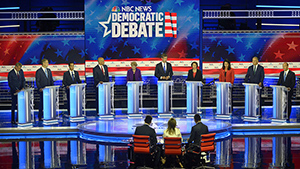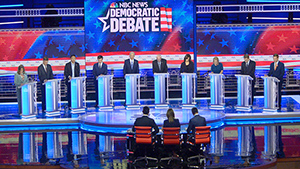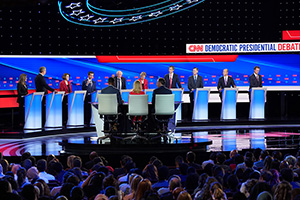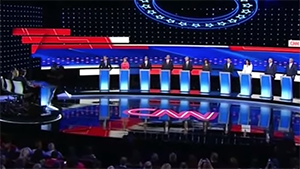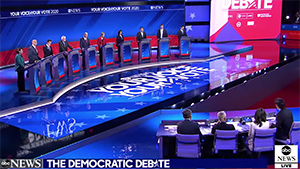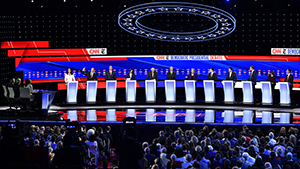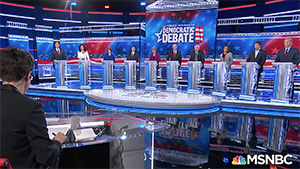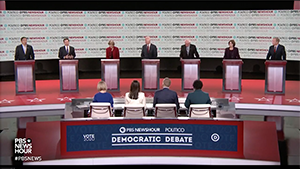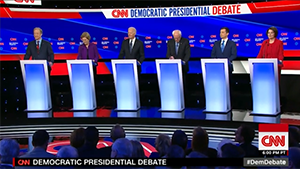- Home « interest
Groups | Pre-Primary
Period « Primary
Debates
Primary Debates
On Dec. 20, 2018 the DNC announced a framework for 2020 presidential primary debates that envisages 12 debates, six in 2019 and six in 2020 (+). Participation in the first seven debates was based on the candidates' ability to meet polling and grassroots contribution thresholds which were announced as the campaign progressed. Starting with the eighth debate, a delegate threshold was added and with the ninth debate the contribution threshhold was eliminated. The Republican contest was quiet due to the dominance of incumbent President Donald Trump; his longshot challengers engaged in a handful of debates/joint appearances. A debate for lesser known candidates of multiple parties is scheduled for Mar. 4, 2020.
____________________________
| 2020 press release |
||
| CNN and the Des
Moines Register |
||
| Qualifying
Criteria:
Four-Poll Threshold or Early State Polling Threshold: 5%
support in at least four qualifying polls (national or early
state) or 7% in
two single state polls from any of the four
early states between Nov. 14 and Jan. 10 and 225,000
unique donors including a minimum of 1,000 unique donors per state in
at
least 20 U.S. states. 6 Candidates: Biden, Buttigieg, Klobuchar, Sanders, Steyer, Warren. Not In: Bennet, Bloomberg, Delaney, Gabbard, Patrick, Yang. |
||
| ABC News and WMUR-TV |
||
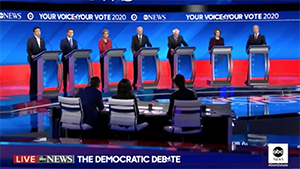 |
Qualifying
Criteria: (1) Delegate threshold based on the results of the Iowa caucuses, at least one pledged delegate; or (2) both a polling requirement and a grassroots fundraising requirement (same as for the Jan. 14, debate). 7 Candidates: Biden, Buttigieg, Klobuchar, Sanders, Steyer, Warren, Yang. Not In: Bennet, Bloomberg, Gabbard, Patrick. |
|
| Feb. 7, 2020 in
Manchester, NH. |
||
| NBC News and MSNBC |
||
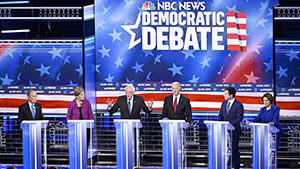 Feb. 19, 2020 in Las Vegas, NV. |
Qualifying
Criteria: (1) Delegate threshold based on the results of the IA caucuses and NH primary, at least one pledged delegate, or (2) Polling threshold: 10% or more support in at least four polls, either national polls, or single-state polls of SC, and/or NV. (The qualifying window for polls begins on Jan. 15, 2020 and ends at 11:59 pm Eastern Time on Feb.18, 2020). 6 Candidates: Biden, Bloomberg, Buttigieg, Klobuchar, Sanders, Warren. Not In: Gabbard, Steyer. |
|
| |
||
| CBS News and CBC
Institute |
||
press releases |
Qualifying
Criteria: (1) meeting delegate threshold based on the results of the IA caucuses, NHe primary and NV caucuses, at least one pledged delegate, or (2) meeting a polling threshold: 10% or more support in at least four polls, either national or South Carolina polls, or 12% in two single-state polls of South Carolina. (The qualifying window for polls begins on Feb. 4,, 2020 and ends at 11:59 pm Eastern Time on Feb. 24, 2020). 7 Candidates: Biden, Bloomberg, Buttigieg, Klobuchar, Sanders, Steyer, Warren. Not In: Gabbard. |
|
| Feb. 25, 2020
in Charleston, SC. |
||
| CNN and Univision |
||
press releases |
Qualifying
Criteria: Delegate threshold: candidates must have been allocated at least 20% of the total number of pledged delegates allocated as of 9 am Eastern Time on March 15, 2020. 2 Candidates: Biden, Sanders. |
|
| Mar. 15, 2020
in Phoenix, AZ. Washington, DC |
The 2019-20 Democratic Primary Debates
The
DNC
has
tightened
the
criteria
for
partipation
in
the
debates
as
the
primary
season
progressed.
The
first
two
debates
had
20
candidates
and
were
held
over
two
consecutive
nights
because
of
the
large
field
of
candidates. By the eleventh debate, which was moved to
Washington, DC because of coronavirus, only two candidates remained on
stage.
Conducting
the
June and July debates over two nights was a challenge. The
qualifying
candidates
participating
each
night
were
determined
at
random. The
Democrats'
approach to
handling the large field for these first two debates did stand in
contrast to the Republican 2015-16 debates, where polling was the only
criterion used and lower tier candidates were relegated to "B" or
"kiddy table" debates.
For
subsequent
debates
the
polling
and
contribution
criteria
were
progressively
raised.
Excluded
candidates
and
critics
argued
that
the
DNC
and
not
early
state
voters
were
narrowing
the
field
and
pointed
to
a
lack
of
transparency
in
how
the
DNC
came
up
with
their
rules.
Several
candidates
bowed
out
after
failing
to
meet
the
criteria
for
the
third
debate.
News
reports
started
to
refer
to a field of ten
candidates, while 19 candidates were still in the race at that
point. The well
resourced Tom Steyer invested millions in an advertising campaign
to achieve the polling and contribution threshholds, thereby qualifying
for the fourth debate, while candidates with significant
experience in public office such as Sen. Michael Bennet or Gov. Steve
Bullock were excluded. The seventh debate in Los Angeles on Dec.
19 debate had only seven
candidates on stage although 15 were still running. The eighth
debate in Manchester on Feb. 7 excluded several candidates who had been
running New Hampshire-focused campaigns, notably Sen. Bennet, former
Gov. Deval Patrick and U.S. Rep. Tulsi Gabbard.
Debates
can
make a difference. Quite a few New
Hampshire voters who had been undecided said Sen. Amy Klobuchar's
performance in that debate won them over; Klobuchar achieved a stronger
than expected showing in the Feb. 11
primary that allowed her to stay in the race for a few more
weeks. The ninth debate in
Las Vegas on Feb. 19 may have been the most consequential. Former
New York City
Mayor Michael Bloomberg made his first debate appearance and it did not
go well; he drew many attacks, particularly some sharp blows from Sen.
Elizabeth Warren, that seriously hurt his campaign. This debate
was also
the most watched Democratic primary debate ever. At the tenth
debate in Charleston on Feb. 25, the moderators had trouble maintaining
order and there was a lot of crosstalk among the candidates. The
eleventh debate will be different in that it will not have an audience
or a spin room due to coronavirus.
Debate
criteria
are
also
significant
not
just
because
of
the
message
inclusion
or
exclusion
of
candidates
sends
to
viewers
and
voters,
but
because
organizers
of
some
candidate
forums
use
them
to
determine
which
candidates
to
invite.
Televised
debates
are
very
tightly
controlled
events.
Formats
are
fairly
similar,
allowing
candidates
one
minute
or
one
minute
and
15
seconds
to
respond
to
questions.
(Show
of
hands
questions
were
dispensed
with
after
the
first
debate).
The
first
ten debates all had large audiences, with attendance primarily
determined by the DNC and the relevant state party; observers have
noted that this plays to the worst instincts of politicians. For
all
of
the
debates,
the
candidates'
positions on stage were determined by polling numbers. Candidates
at the outer edges of the stage tend to get markedly less speaking
time. During and after a debate pundits and analysts assess
winners and losers. In the spin room at the debate site,
surrogates and sometimes the candidates themselves spin
reporters. It is always interesting to see who a campaign puts
forward as it spinner(s). Meanwhile the campaigns email out video
clips, favorable coverage and tweets in an attempt to shape perceptions
of what happened. Campaigns seek to build momentum off solid
debate performances and some may go so far as to claim a debate as a
"break out" moment.
[Ed. note. Although it is difficult with the large number of
candidates, some thought might be given to experimenting with the
formats. In 2015-16 Donald Trump went through 11 of these events
and emerged unscathed (+). For
example, positioning candidates on stage by poll numbers makes for good
television, but for the earliest debates consideration might be given
to random positioning. The idea of single issue debates,
discussed extensively on subject of climate change, might be helpful in
getting deeper into issues].
Sept.
24,
2019
in
New
York,
NY
-
Business
Insider
Debate
Oct.
26,
2019
in
Nashville,
TN
-
Conversation
at
Politicon
(>)
Oct.
28,
2019
in
Detroit,
MI
-
Republican
Presidential Debate at Forbes
Under 30 Summit
Mar.
4,
2020
in
Chicago,
IL
-
Open
President Debate hosted by Free and Equal Elections and Open the Debates

